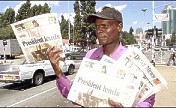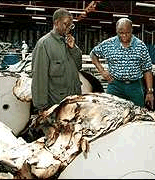
South
Africa's leading independent newspaper, the Mail&Guardian,
has been sold to Zimbabwean entrepreneur and
newspaper publisher Trevor Ncube.
Südafrikas führende
unabhängige Zeitung
"Mail&Guardian" wurde an den
simbabweschen Medien-Unternehmer Trevor Ncube
verkauft. |
|
In 1992, Trevor
Ncube unsuccessfully applied for a position as a
journalist at what is now the Mail &
Guardian. Today he owns the newspaper.
1992
bewarb sich Trever Ncube erfolglos um eine Stelle
als Journalist bei der Zeitung, heute gehört sie
ihm. |
MEDIA IN
ZIMBABWE
A new law curbing the activities of
independent and foreign news media in
Zimbabwe has been enacted by the
government in March 2002.

 |
|

Mit einem
Sondergesetz hat die Regierung im März
2002 die unabhängige und die
ausländische Pressearbeit in Simbabwe
drastisch eingeschränkt. |
| |
|
|
In
January, 2001, the printing press of the
only private daily newspaper, The Daily
News, was bombed hours after Information
Minister Jonathan Moyo vowed to silence
it as an "enemy of the state".

Im Januar
2001 wurde die Druckpresse der
"Daily News", der einzigen
privaten Tageszeitung Simbabwes, durch
eine Bombe zerstört - wenige Stunden
nachdem Informationsminister Moyo gesagt
hatte, die Zeitung müsse als "Feind
des Staates" zum Schweigen gebracht
werden. |
|
THE RULES
The "Freedom of Information and
Right to Privacy Bill" establishes a
Statutory Media Commission, which will
require all journalists to apply for a
one-year renewable licence.
Accreditation will be granted by a panel
hand-picked by Information Minister
Jonathan Moyo. Licences will only be
granted if a stringent set of
requirements is met, and may be revoked
at any time. Foreign journalists may be
given permission to work in Zimbabwe for
a "limited period," but the law
does not stipulate how long that might
be. Any journalist found guilty of any
offence will face a fine of up to
Z$100,000 ($1,875) or two years in jail. |
| |
|
|
| Trevor
Ncube's views on Zimbabwe |
|
 |
TREVOR
NCUBE:
I don't think there is any way you can exaggerate
the brutal killing of 100 people inside three,
four months by a regime that is determined to
desperately hold on to power. I don't think there
is any way you can over-exaggerate the collapse
of a currency. As I sit here talking to you, the
Zimbabwean dollar to the US is 1 to 800. Two
years it was 1 to 18. Thereabouts. Just to show
you. You can't exaggerate that. Those are the
facts that are on the ground. I think, to answer
you question, we've had a regime that has been in
power for too long. A regime that has grown
accustomed to not being held to account. But a
regime, nonetheless, which is still determined to
hold onto power. Why hold onto power? To hide
some of the crimes that they've committed against
humanity. The corruption that has become endemic
as far as the Robert Mugabe regime is concerned.
They are scared about what will happen to them
the day after they are kicked out of power. So
they hold on as much as possible to ensure that
the skeletons don't fall out of the cupboard.
MONEYWEB:
But when are those skeletons going to come out?
How long might it yet take?
TREVOR NCUBE:
It's become difficult. If you'd asked me six
months ago, I would have said maybe in six
months' time. But the man has evidenced some
staying power which is difficult to understand.
But I think the blame lies with Zimbabweans who
have been rather too patient with him. But I
think the situation now, with the starvation that
is taking place? When politics of the tummy
begins to play, to take a front seat as it were,
you never know what will happen.
Trevor Ncubes Ansichten
über Simbabwe
und über die Aufgabe seines Medien-Konzerns
(Zusammenfassung)
Ncube beschuldigt die Regierung Mugabe schwerster
Vergehen gegen die Menschenrechte. Nach seiner
Ansicht fürchten Mugabe und seine Leute, die
Macht abzugeben, weil sie dann vor Gericht
gestellt werden könnten. Zur selben Zeit glaubt
er, dass die Menschen in Simbabwe zu viel Geduld
mit Mugabe hatten. Doch der Hunger werde sie zu
Aktionen treiben.
Mit der Übernahme des
"Mail&Guardian" sieht Ncube die
Möglichkeit, für Afrika ein verantwortliches
Sprachrohr gegenüber der Welt zu schaffen, das
gleichzeitig den Mächtigen auf die Finger sehen
soll.
|
|
Ncube
(39) became one of the founders and shareholders
of the Zimbabwe Independent
and The Standard
in 1996 and 1997 respectively. He was editorial
director of the Zimbabwe
Independent and The
Standard between 1998 and
2000 and editor in chief of the Zimbabwe
Independent between 1998 and 2000.
In 2000, Ncube became publisher and chief
executive of the Zimbabwe
Independent and The
Standard, a position he
still holds.
He began his journalist career in 1989 as
assistant editor of Finance
Gazette and was executive
editor between 1991 and 1996. In 1994 he received
the Zimbabwe Editor of the year award.



Before entering journalism, Ncube spent time as a
teacher and as assistant lecturer in the History
Department of the University of Zimbabwe. He has
been acting chair of the Commonwealth Press Union
since 1999.

"My company's
long-term vision is to be a regional media player
and the Mail & Guardian with its strong
presence in the Southern African region has
presented us with an opportunity to set this in
motion. The Mail & Guardian is a quality
product that has a proven track record in the
democratic transformation taking place in South
Africa and in the continent's rebirth. Indeed,
the Mail & Guardian is a giant symbol of
press freedom. It has been a long-standing goal
of mine to be associated with such an emblematic
champion of the struggle for a democratic
dispensation, not just in South Africa but in the
region as a whole. Its distinguished past is
matched only by its potential for growth. I am a
strong believer in press freedom as a vital
ingredient of democracy and economic prosperity.
As Africa battles to deal with the numerous
challenges presented by the new millennium, it
will need voices that articulate its aspirations
and achievements to the rest of the world and
hold its political and business elites to
account. The Mail & Guardian is well
positioned to play this important role as
Africa's commitment to a new partnership with the
international community unfolds."
 |